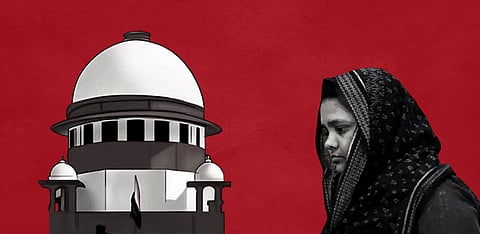

"Floodgates will open" if the Supreme Court allows third-party petitioners to challenge the Gujarat government's Order remitting the life sentence of 11 convicts in the Bilkis Bano gangrape and murder case, the Supreme Court was told today.
——
TODAY, the Supreme Court heard arguments against the maintainability of public interest litigations (PIL) filed by five "third party" intervenors in the Bilkis Bano case.
The PILs have been filed against the remission of sentences of 11 persons convicted of gangraping Bilkis Bano and murdering her family during the 2002 Gujarat pogrom.
A division Bench of the court comprising Justices B.V. Nagarathna and Ujjal Bhuyan are in the process of hearing Bano's petition, along with those filed by member of Parliament (MP), Mahua Moitra; former MP, Subhashini Ali; National Federation of Indian Women, the women's wing of the Communist Party of India; and two others.
Bano was 21 years old and pregnant when she was gangraped. Seven of her family members, including her three-year-old daughter, were murdered by the 11 convicts who were serving rigorous imprisonment for life for the crimes.
Today, advocate Rishi Malhotra, appearing for one of the convicts, stated the petitions are "speculative" in nature.
They were filed without having seen the Gujarat government's Order granting remission and they contain phrases like "it appears to be", Malhotra contended.
It may be mentioned that the remission Order was only made available to the petitioners after the Supreme Court ordered so in September last year.
Challenging the maintainability of the petitions filed by persons other than Bano, Malhotra cited the Supreme Court's judgment in Simranjit Singh Mann versus Union of India (1992).
In that judgment, it was held that a third-party petitioner does not have any locus standi to challenge the conviction or sentence awarded to a convict while taking the recourse of Article 32.
Reference to the Simranjit Singh judgment was shot down by the Bench, stating that there is a key difference between the facts of that case and the present one.
"There is no challenge to conviction or sentence. Here, they are essentially challenging an administrative Order granting remission… we are in the realm of administrative law," Justice Nagarathna said.
Malhotra, while continuing with his submissions, stated that if remission Orders are allowed to be challenged in courts, that too by third parties, "it would set a dangerous precedent… Floodgates will open… A Pandora's Box will open".
Additional Solicitor General S.V. Raju made his submission on the nature of remission of sentences.
"Remission is nothing but reduction of sentence… Remission only changes how it will be executed," Raju added.
Raju also cited the Supreme Court's judgment in State (Government of NCT of Delhi) versus Prem Raj (2003) in which it was observed that "[r]emission is reduction of the amount of a sentence without changing its character.
"In the case of a remission, the guilt of the offender is not affected, nor is the sentence of the court, except in the sense that the person concerned does not suffer incarceration for the entire period of the sentence, but is relieved from serving out a part of it."
According to Raju, the court was essentially dealing with a challenge to the reduced quantum of sentence.
"Insofar as the quantum of sentence is concerned, a third party can never have a say," he said.
Senior advocate Sidharth Luthra, appearing for one of the convicts, recognised that the court is dealing with a challenge to an administrative Order and not a judicial Order.
However, Luthra stressed that the exercise of power of granting remission was under the Code of Criminal Procedure, 1973 (CrPC).
Section 432 of the Code Of Criminal Procedure allows state governments to grant remission to convicts.
The provision states that "when any person has been sentenced to punishment for an offence, the appropriate government may, at any time, without conditions or upon any conditions which the person sentenced accepts, suspend the execution of his sentence or remit the whole or any part of the punishment to which he has been sentenced."
Defending the executive discretion in granting remission based on mitigating factors, Luthra asked, "Are we to say that because of the heinousness of crime, there is no possibility of reformation?"
"Insofar as that is concerned, we had put a question on whether (the convicts) had shown any remorse or repentance," Justice Bhuyan said, referring to the question that was put up by the Bench in yesterday's hearing.
Responding to the question, Luthra said "a lot of factors" are considered while granting remission, "including the possibility of reformation and rehabilitation."
Luthra ended his submissions by stating that the "society's cry for justice" cannot be the basis for challenging an Order granting remission.
"That chapter was over when people were convicted," Luthra added.
Clarifying the stand of the petitioners, senior advocate Indira Jaising, appearing for Moitra, told the Bench, "We are not asking for enhancement of sentence… Mitigating circumstances were taken into consideration when the Central Bureau of Investigation (CBI)'s appeal for the death penalty [by the Gujarat High Court] was rejected."
At 2.30 p.m. tomorrow, the Bench will hear the petitioners on the issue of maintainability of their petitions.